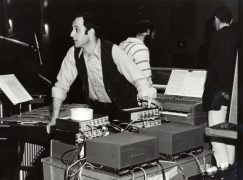The Carnegie Hall minimalism ‘riot’
mainThey’re still arguing whether the 1973 concert audience objected to its first taste of minimalism, or actively erupted.
Read here.


They’re still arguing whether the 1973 concert audience objected to its first taste of minimalism, or actively erupted.
Read here.

The autograph manuscript of the fourth movement of…

We have been notified of the passing of…

Franz Welser-Möst has pulled out of the opening…

Elvis If he had lived, Elvis would have…

Session expired
Please log in again. The login page will open in a new tab. After logging in you can close it and return to this page.
Fun stuff, it takes me back to arguments I’ve had with people about Glass: would his masterpieces of the late 70’s and 80’s have been possible without those early experiments in “pure sound” with “no content”? In particular I think of Akhnaten, which I think is a sublime opera — aren’t those maracas in the dance music in Act II? As if he were inserting a hidden tribute to Reich within a very traditional, “musical” work filled with a evocative invention and daring (I think of the famous funeral music for Amenhotep as Metallica Verdi).
Clearly, whenever you make an “-ism” of something you choke off its breath, its life-force. Maybe this is why Glass himself rejected the label. Yet minimalism gave us a lot, and it keeps on giving now, as it continues to be transformed and thus surpassed.
Yes, Glass is the genius in whose powerful music all repertoire of those oldfashioned silly fogeys disappears, like muddy rivers dissolving into the ocean! He is the embodiment of the Greatness of our era… maybe even more so than Boulez. He is the Mount Everest of music, or the Grand Canyon. I go for the Grand Canyon because it’s so much more accessible. And listening to Glass is like jumping into its impressive, uplifiting space. And Glass is a powerful symbol of how taxi drivers or plumbers can be successful as artistic icons! Chances for everybody… a message which cannot be repeated often enough.
Sally
Yes, Sally, chances for everybody, inclusion, and the most evident prove of Glass’ greatness is that this wonderful message is repeated on and on and on – a mantra for our age – greatness ad nauseam!
So inclusion is job rotation: taxi drivers become “composers” even if they are boring their audience by repeating the same simple stuff all the time and real composers, who know their job, become taxi drivers, because they are kicked out of the business.
Correct!
The irony is, that in countries where the state has created a supportive funding system to make sure that composers won’t starve, or want to prevent the situation that composers won’t be able to write their music because of having to work at a day job, the infestation of poseurs and amateurism is at its most obvious. For instance, in the Netherlands millions of euros are being spent yearly on new music production, many families live on tax payers money meant for creating a free space for new music, but the results are deplorable and the ‘music’ mostly played once before a minor audience at the very margins of music life, and then discarded into oblivion.
This is a lecture at Amsterdam University exploring the subject, which shows how well-intended government support created the opposite of the initial intention:
http://johnborstlap.com/state-patronage-for-new-music-in-contemporary-holland/
Also in Germany there is much money for new music, but there are more different sources of support. But the committees making the selections, are made-up of ‘experts’, and they all happen to find that a certain postwar aesthetics is the only way of showing the world that the country has overcome fascism, so any contemporary product which carries recollections of music, or – worse! – Germany’s own rich humanistic musical tradition, is taboo, out of fear to be seen as rightwing reactionary or worse:
http://subterraneanreview.blogspot.nl/2016/01/donaueschinger-klangtage-das-biergold.html
Hence the popularity and established cult status, in Germany, of sound artist Lachenmann, who has told audiences repeatedly that ‘music is dead’:
http://subterraneanreview.blogspot.nl/2015/11/be-liberated.html
Meanwhile, such people have a good time, enjoying the death of music and repeat the ‘Stunde null’ of Germany’s Untergang in 1945 to general acclaim, and generously paid.
And meanwhile the modern music hubs like the Darmstadt Summer Courses for New Music (generously subsidised) continue to celebrate Germanic progress:
http://www.youtube.com/watch?v=jwlCD2y2tBA
…. which is not the only place where progress is warmly cultivated:
http://www.youtube.com/watch?v=5zYxYPv12mA
Sick, isn’t it?
Reading that article there is a moment of sheer, if perhaps unintentional genius. The author compares Reich’s work to a ‘visual field test’. Have you ever had one? It is the perfect metaphor for minimalist music. It’s torture and it just goes on and on.
No one’s forcing you to listen – if you don’t love it, just don’t listen to it.
Some of my friends who played on Glass recordings described the ordeal of playing the same 4-note pattern 37x and on the 38th time, ONE NOTE changed. This “music” has come to pervade our film and TV commercial scores ad nauseum.
ad nauseam
A ‘nauseum’ is in itself an appropriate term for Glass: it is something awful in a Glass box in a nauseum.
Do you sense that I’m idealizing PG? Then I’ve clearly been as incoherent as is much of his work. So here, then, is a confession: most of Mozart leaves me cold, though I fall to my knees whenever I hear a good performance (Uchida!) of the A Minor Rondo. The majority of Schubert’s output does little for me, even if you find my face wet during Richter’s delivery of the D. 960 sonata. Much of Brahms bores me as much as the 4th Symphony turns my whole body into goose-flesh.
Great artists fail more often than they succeed, and PG is no exception. But if the Met ever gets over its studied neglect of Akhnaten, I’ll be there to marvel at the intensity and quiet daring of that music.
Here is a link to the New York Times review of the concert in question.. The chief critic of the Times in those years, Harold C. Schonberg, was a fierce enemy of the avant-garde. The piece must have been shocking to audiences because, at the time of this concert, the extreme complexity of post-war, post-Webern, serialism, was revered as a received wisdom by most composers.
https://www.nytimes.com/1973/01/20/archives/music-a-concert-fuss-piece-by-reich-draws-a-vocal-reaction-the.html
So-called minimalism belongs to the discothèque or as background to aerobics – or to the dancing house rather than to the concert house.
Indeed. There is nothing wrong with it in itself, it is for people for whom classical, serious music is too difficult. But there is everything wrong with it when it is claimed to be serious art music.
Sorry John, it’s hard to take you seriously when you can’t even take hip-hop seriously. When you educate yourself, you may eventually have some argument.
Exactly. It removes all the music from music. They took Mozart’s worst feature, the endless repetition of left-hand patterns, the Alberti bass, and made a gimmick of it. Repetition always has purpose and culmination, release, but not in their so-called music. It’s sound design, that’s all. Only Glass has also written some real music, which I have accidentally encountered. But there were THREE minimalists, Glass, Reich, but also the over-looked Robert Moran, too-often ignored, and the most musical of the three. And he is still very active as a composer.
Now, just imagine if they had built on one of the musical values, such as Line and Ornament, and expanded that to multiple voices, or kept the style as is and added much greater rhythmic variety. So much can be done with classical values, which is why my nonprofit organization is called Performing Arts Traditions. We need those core values. When you get too far to the fringe, you fall off, you are too far from the anchoring core. Seizing on the ideas in early 20th century art and extracting from that only the non-values of trendiness and gimmickry and novelty is non-art. Go back to the beginning and start over.
Minimalism is what happens when you have people who want to claim the mantle of “composer” without having to actually learn how to compose. It was a parlor trick that a few people managed to turn into long careers, that’s all.
For my taste, so-called “minimalist music” is the same to good classical music as common wallpaper is to good artistic painting. Apparently some people feel more comfortable when being in a room that is “decorated” by pretty wallpaper than, and/or at least just as inspired as, being in one that has Rembrandt’s portraits on its walls. Some minimalist pieces may be adequate as an accompaniment to something such as for example a movie, but they are certainly nowhere near satisfying for me as concert music.
I love this whole topic. It brings out the best in this group. Just dripping with condescension and arrogance. “some people” just makes me laugh.
Those among them who have good sense of humor sometimes make me laugh too.
Have you tried real, disciplined meditation?
my personal favorite minimalist composition is Reich’s “Come Out”. Anybody who thinks that is music is a monkey’s ass. And that includes Reich himself. Talk about putting the world on this is it.
It’s a wonderful piece – if you don’t like it, you don’t need to listen to it. When you allow yourself to be aware and listen, there’s no end the the wonders you can discover in listening to “Come out”.
So much of minimalism leaves me cold, especially this ‘post-minimalism’ idiom that everyone and their mother indulges in nowadays. Yet the music of Louis Andriessen is so much more than all this barren, soulless, insipid, ambient rubbish people write (and win awards for). His music has so much more substance and complexity, is far more dissonant than anything Reich ever wrote and also more rhythmic and colorful. Not to mention how much fun and adventurous it is to play!
I LOVE Andriessen….. often I play his CD’s in the cellar here when nobody can hear me. It is a totally inspiring sort of music, with the hard-edge crisp of our times, with the jazzy cool that Mozart & Co so desperately miss, combined with the stimulating, calvinistic choral admonishments of his country of birth, and with the disruptions all the time when you don’t expect it, so you suddenly wake-up again! (With Bach I fall asleep before the 2nd subject.) And then his anti-bourgeois stance. Really very courageous while he is paid by that same bourgeois, conservative society! That really requires courage. No, for me A is the only still living remnant of the golden sixties… when everything seemed possible. I attended an Andriessenfestival in London quite some time ago, a whole weekend of this fresh Dutch clog music, smelling of bulbs and cheese, and had the best time of my life – I could for a weekend forget all the work of winding the paper on the cardboard tubes at the toilet paper factory. But at that weekend I knew he was also writing for me, for the workers! You can’t say that of Reich or Glass. So stupid that there were not enugh listeners… but I saw a crowd of school children in the audience, with teachers keeping them dowm, so at least the schools realized the educational value to be had there!
Here are the wonderful chorusses with real Plato texts, so subtle!
https://www.youtube.com/watch?v=oaATmagbYsw
But this is my favorite, from the time before he got too serious and thus, a bit boring:
https://www.youtube.com/watch?v=I2g2_60jMHY
Sally